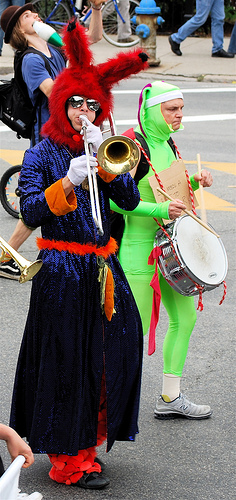
EE
@ honkfest
alternative street punk
marching band convergence
Boston, Somerville, Cambridge, October 5-8, 2007

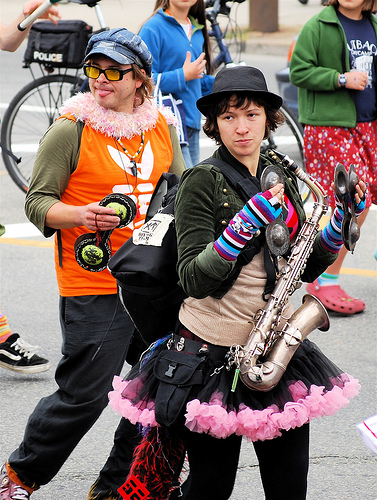
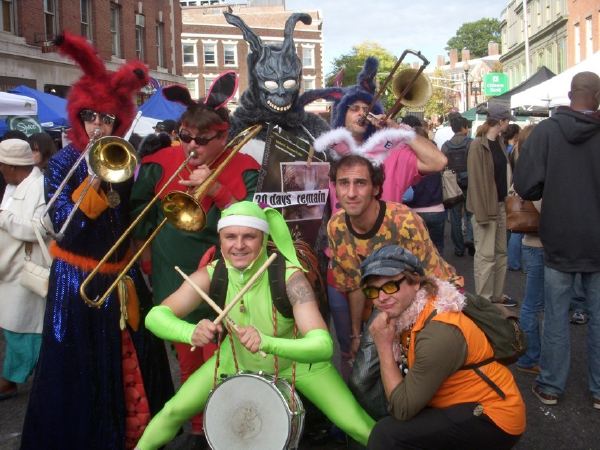
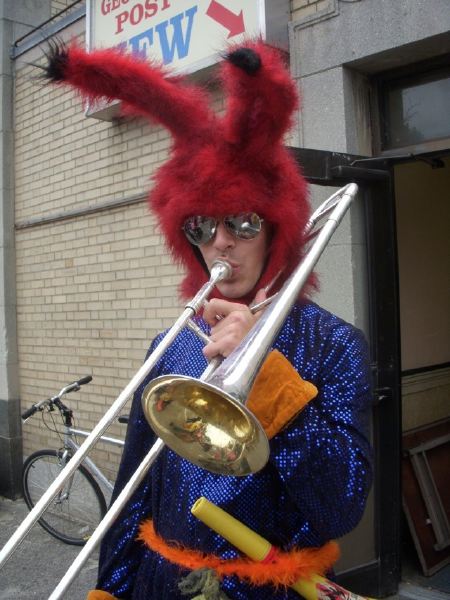
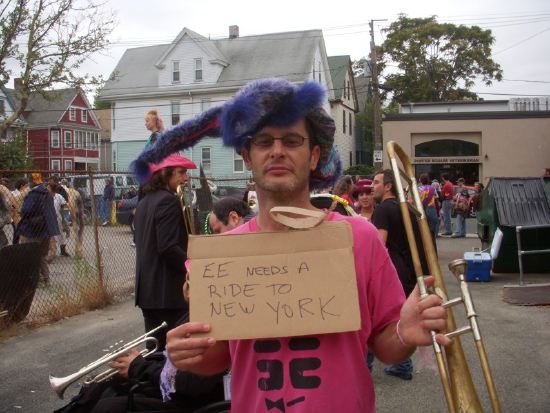
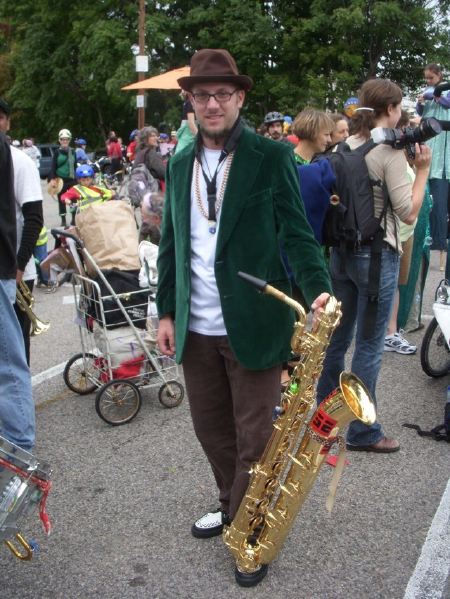
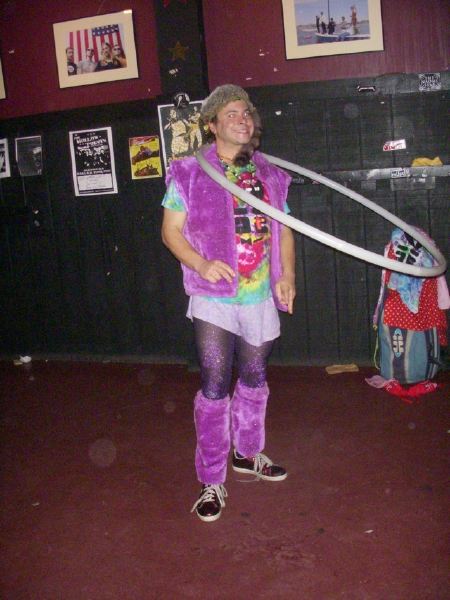
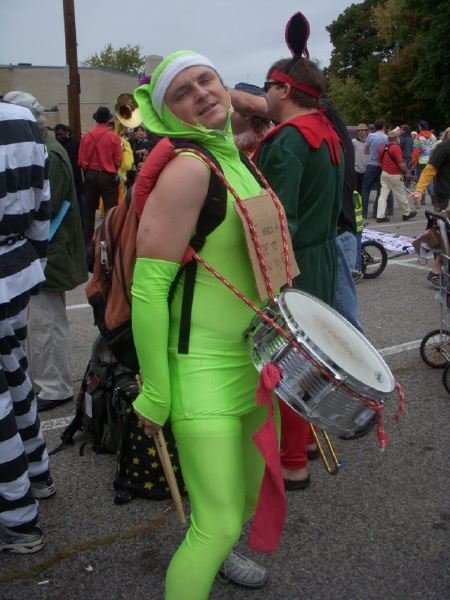
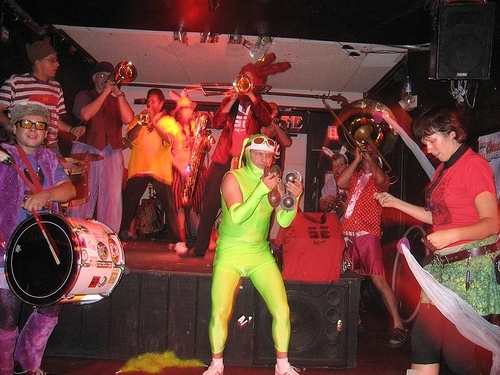
EE opening HONK fest at The Abbey Pub
Sommerville, Mass
|
Also check out the tremendous work at the official site: Environmental Encroachment started bringing "music" into the streets, abandoned buildings, forests, bridges, etc, in around 1996. We started using drumming, and soon added brass. In 1998 EE performed in the country's largest haunted house. The house including the exhibit were held at the "Science of Fear" exhibit at Chicago's Museum of Science and Industry. Music and Costumes were integrated into a built environment in order to entertain, and scare. In 1997, EE travelled to San Francisco and participated in the site-specific carnviale, "Defenestration". A marching band was formed by Peter Kadyk, Patrick Kadyk, Anah Coates, Norman Ruthorford, and many more. The event was documented by Christian White. EE had four shows in collaboration with San Francisco artists in which envionmental playgrounds were build, costumes worn, music made, and other art forms such as dance, projection and shadow puppetry became involved. EE started marching when we came back to Chicago from San Francisco, maybe before? Marches could be both spontaneous and also themed for after-show/parties. EE encroached with forrays into Wicker Park, or Burning Man, as well as paid performances at events such as NASCAR and Lollapalooza. Honkfest was a dream come true. Bands being site-specific. Bands using fashion, dance, humor as well as musical mediums. Bands using themselves to spread visions. Bands unifying to develop other humans, to inspire them. Patient teachers. Like-mindedness. Environmental Encroachment was able to bring nine members to Honkfest. If you don't remember us: Bobby Danger-Sousaphone, Mikey Smith-t-bone, Dan Mello-t-bone, Leslie-a.sax, JLobst-trumpet.., BargeeBus-vox/trumpet, misterPetey-drums,quac, Carlos-drums,quacs, Blake-drums. Electronic music, everyone being a dj, the record industry, the bureaucracy, and various chaotic elements are driving some to develop a raw sense of musicianship, of jazz, of the human element! Brass and drum music has been part of American music forever, and continues to cycle through these times with a vengeance just gearing up. ------ Here is a reprint of a review: March madness Emma Goldman knew that a revolution without a groove was a disaster waiting to happen. When the Bolsheviks brutally consolidated their hold on the emerging Soviet Union, the anarchist famously rejected the authoritarian party, declaring "If I can't dance, I don't want to be part of your revolution." Goldman would feel right at home in Somerville this weekend, when HONK!, the second annual festival of activist street bands, turns Davis Square into a raucous, free-wheeling celebration of music's power to galvanize the masses. Part of an incipient movement, the percussion and horn-driven ensembles share a dedication to progressive causes while representing a disparate array of styles including carnival music from New Orleans and Brazil, Nigerian Afrobeat, hip-hop, klezmer, funk, and Balkan brass bands. "Music is the cornerstone and inspiration for many cultural and political movements," says Janine Fay, one of the festival's organizers. "This event is inclusive, free, non-commercial, and community based. When we demonstrate for peace, equal rights, and justice, the HONK! bands amplify our voices. It's a positive, fun, and funny way to approach creating change." The festival kicks off Friday afternoon at Tufts University's Distler Performance Hall with "The Philosophy of Honk: Street Bands, Civic Engagement, and Social Change," a symposium featuring a performance by the Original Big Seven Social Aid & Pleasure Club from New Orleans and a panel discussion including ethnomusicologist Charles Keil, author of the classic book analyzing the 1960s Chicago blues scene "Urban Blues." The evening concludes with an open discussion on HONK! band politics with the Brass Liberation Orchestra in Somerville's Dilboy VFW Hall, and a jam session at the Abbey Lounge in Inman Square. The main event takes place on Saturday from 11:30 a.m. to 6 p.m. around Davis Square, as the bands march, dance, or otherwise promenade around five stations (7 Hills Park, Statue Park, Davis Square Plaza, Redbones, and Dilboy VFW Hall). Sunday puts the bands back into their natural element with a parade to "Reclaim the Streets for Horns, Bikes and Feet," which runs from Davis Square to Harvard Square, and features the HONKers as well as Bread & Puppet Theater, Open Air Circus troupe, and special guests Click and Clack, the Tappet Brothers of "Car Talk" fame. "Saturday's festival is all acoustic and mobile," Fay says. "We'll have stations and they'll move from one place to another. When they're marching in the parade on Sunday, we'll have one PA system on a reviewing stand for the Tappet Brothers so they can review the bands and scene as it goes by. Since the parade is for reclaiming the streets, having Click and Clack seemed like a nice touch of irony." "We're all doing similar things in different places," says Maury Martin, a Second Line reed player and Somerville family doctor. "We started talking to other bands and everyone really got into the idea of connecting with one another, exchanging experiences and music. We said we'll try to give you money to offset expenses, but they all signed on before we knew what we could offer them. By the end of the weekend everyone was playing with everyone else, and we had the start of some kind of network. It was like a gathering of the tribes." Fay volunteered last year, selling T-shirts, which is the only commercial venture associated with the festival. She was so taken with the scene that instead of leaving at the end of her three-hour shift, she ended up staying all day, soaking up the festive vibe. She was particularly struck by the effect on unsuspecting pedestrians who suddenly found themselves in the midst of a street party and joined in the revelry. "It turned an area of Boston into something that looked more like New Orleans," says Fay, who's helping coordinate the efforts of some 100 volunteers. "The streets were filled with people dancing and with rhythms and sounds from all over." Last year's festival featured a dozen bands, while this year's HONK! has drawn at least 18 ensembles, including Brooklyn's Hungry March Band, Oakland's Brass Liberation Orchestra, Chicago's Environmental Encroachment, and Pink Puffers Drum & Brass Phunk Band, which can be heard playing weekly in the ancient streets and plazas of Rome. Most of the ensembles are non-professional on principle, welcoming new members on the strength of enthusiasm and energy rather than musicianship. Cakalak coalesced in 2003 at the protests surrounding a Free Trade Area of the Americas meeting in Miami. With about 16 regular members, the band initially focused on beats drawn from funk, hip-hop, and Southern marching bands. But a few years ago, Cakalak connected with a samba band in Sweden, then came back home and transformed the group into an Afro-Brazilian-style batucada percussion ensemble. Even though Cakalak occasionally appears in clubs, the vast majority of its performances accompany political actions, from protests in Washington, D.C., and New York City to antiwar rallies in Fayetteville, N.C. With their ragtag uniforms, antic moves, and spirit of good-time mayhem, street bands don't generally appear to be over-rehearsed. But like many leftist organizations, they can be prone to intensive self-examination. Having fun in the name of a progressive agenda is often a serious business, with bands feeling duty-bound to question everything from gender dynamics and the appropriation of other cultures to internal democracy and basic economic decisions. "Say you're playing on the street and somebody comes up and says, 'I'll pay you $400 to play in my club,' " says Dixon, who helps lead the Saturday morning workshop "The Quieter Challenges of Making a Racket in the Street" in Dilboy Hall. "Our drumheads are ratty, we need new sticks, and we have to pay rent on our rehearsal space. But we want to keep our focus on our activism. Recording is secondary for us. I've been playing with the group for four years, and some people who showed up and started playing with us last week are in love with the whole enterprise. That might not make for a great recording, but it makes for a great rally."
|
Environmental Encroachment (EE)
Copyright ©1996-2008
2137 West Chicago, APT CH, Chicago IL, 60622